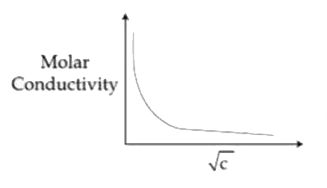When a concentrated solution of an electrolyte is diluted
decreases
increases
remains same
first increases then decreases
The correct Answer is:B
Step by step video, text & image solution for When a concentrated solution of an electrolyte is diluted by Chemistry experts to help you in doubts & scoring excellent marks in Class 12 exams.
Updated on:21/07/2023Topper's Solved these Questions
- ELECTROCHEMISTRYBOOK - TARGET PUBLICATIONCHAPTER - ELECTROCHEMISTRYEXERCISE - CRITICAL THINKING
76 Videos
- ELECTROCHEMISTRYBOOK - TARGET PUBLICATIONCHAPTER - ELECTROCHEMISTRYEXERCISE - COMPETITIVE THINKING
103 Videos
- D AND F-BLOCK ELEMENT BOOK - TARGET PUBLICATIONCHAPTER - D AND F-BLOCK ELEMENT EXERCISE - EVALUATION TEST
15 Videos
- GENERAL PRINCIPLES AND PROCESSES OF ISOLATION OF ELEMENTSBOOK - TARGET PUBLICATIONCHAPTER - GENERAL PRINCIPLES AND PROCESSES OF ISOLATION OF ELEMENTSEXERCISE - Evaluation Thinking
15 Videos
Similar Questions
Knowledge Check
When a solution of an electrolyte is heated the conductance of the solution
AIncreases because of the electrolyte conducts betterBDecreases because of the increased heatCDecreases because of the dissociation of the electrolyte is suppressedDIncreases because the electrolyte is dissociated moreAs the dilution of an electrolyte increases
ASepcific conductance decreasesBMolar conductance decreasesCResistance increasesDNo change takes place in conductanceThe product of ionic concentration in a saturated solution of an electrolyte at a given temperature is constant an is known as
AIonic product of the electrolyteBSolubility productCIonization constantDDissociation constant
The variation of molar conductivity wih concentration of an electrolyte (X) in aqueous solution is shown in the given figure .

The electrolyte X is :
View SolutionWhen concentrated solution of cupric chloride is taken, chlorine gets liberated at anode, in contrast to a dilute solution where oxygen is liberated. However, when aqueous solution of CuSO4 is taken, only oxygen is liberated at anode irrespective of concentration. How do yoy account for this ?
View SolutionWhat is the difference when a concentrated solution of KCl is shaken with blood charcoal in one case and a dilute solution of KCl in the second case ?
View SolutionIf c is the molar concentration of the solution of a weak electrolyte, then its degree of dissociation is proportional to ............ .
View SolutionThe variation of molar conductivity wih concentration of an electrolyte (X) in aqueous solution is shown in the given figure .

The electrolyte X is :
View Solution
